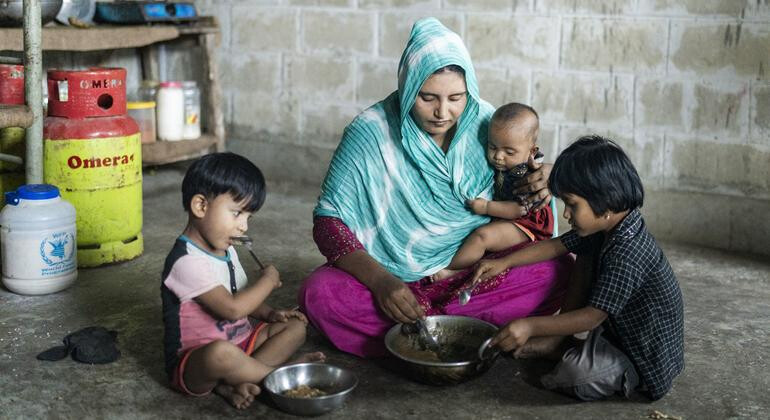
Cox's Bazar, Bangladesh – In a devastating blow to already vulnerable populations, the World Food Programme (WFP) has announced a drastic reduction in food rations for Rohingya refugees in Bangladesh, cutting their monthly food vouchers by more than half. This decision, following closely on the heels of similar cuts and protests in Kenyan refugee camps, underscores the severe strain on global humanitarian aid amid dwindling funding and escalating needs.
The WFP, reliant entirely on voluntary contributions, revealed that it would be reducing the food voucher from 1,515 Bangladeshi taka (£9.70) to 726 taka (£4.60) per person. This reduction, effective immediately, leaves over 1.3 million Rohingya refugees in Cox's Bazar struggling to survive on severely limited resources.
"This sudden and drastic reduction of vital daily food will be devastating for over a million refugees," warned Daniel Sullivan, director for Africa, Asia, and the Middle East at Refugees International. He attributed the cuts to "indefensible harm" caused by reduced aid from major donors, including the US and UK.
The WFP cited unsuccessful attempts to secure additional funding and the inadequacy of cost-saving measures to cover the funding shortfall. The agency's financial woes have been exacerbated by a confluence of factors, including increased global humanitarian needs, the after effects of Donald Trump's aid freeze earlier in the year, and the UK's decision to reduce its aid spending from 0.5% to 0.3% of GDP.
The impact of these cuts is expected to be catastrophic. Refugees report that the reduced voucher will barely cover basic necessities, amounting to approximately 10kg of rice, 1.5kg of lentils, and 500g of salt per month. This is far from sufficient to meet the nutritional needs of a population already facing severe hardship.
Mohammed Mizanur Rahman, Bangladesh's refugee relief and repatriation commissioner, expressed deep concern over the consequences of the ration cuts. "Rohingya refugees have already been barely surviving with the existing monthly food ration," he said. "Cutting the ration over half will have a horrible impact on refugee health and nutrition. Children and women, who make up about 78% of the refugee population, will bear the brunt of this cut."
He also warned of potential increases in crime and social unrest within the refugee camps as individuals struggle to meet their basic needs. "Maintaining law and order in and around the camps will be extra challenging for the government now," Rahman added.
The situation is compounded by rising food prices in Bangladesh, which have more than doubled in the past four years. "To cope with the situation, we had actually been praying for an increase in the $12.50 [£9.70] food ration," said Jafor Alom, a Rohingya refugee in Balukhali camp. "But now, they are cutting down the ration even further. We all have to starve now."
Nur Qadr, a Rohingya teacher in the Jamtoli refugee camp, echoed this sentiment. "It feels like the world wants to starve us to death," he said. "We are human beings, just like the people in [western] nations. We are already barely making it through."
The Rohingya crisis is not an isolated incident. The WFP has also announced significant cuts in food rations for refugees in Kenya and warned of a looming hunger crisis in Somalia, where a million people are at risk due to conflict, drought, and inflation. The agency is facing a $300 million funding shortfall for its operations in Somalia alone, forcing it to reduce aid to 820,000 people per month, down from a peak of 2.2 million in 2024.
The global humanitarian community is now facing an unprecedented challenge, with funding shortfalls threatening to exacerbate existing crises and create new ones. The drastic cuts in food rations for Rohingya refugees serve as a stark reminder of the urgent need for increased international support to prevent widespread hunger and suffering.
[Copyright (c) Global Economic Times. All Rights Reserved.]






























